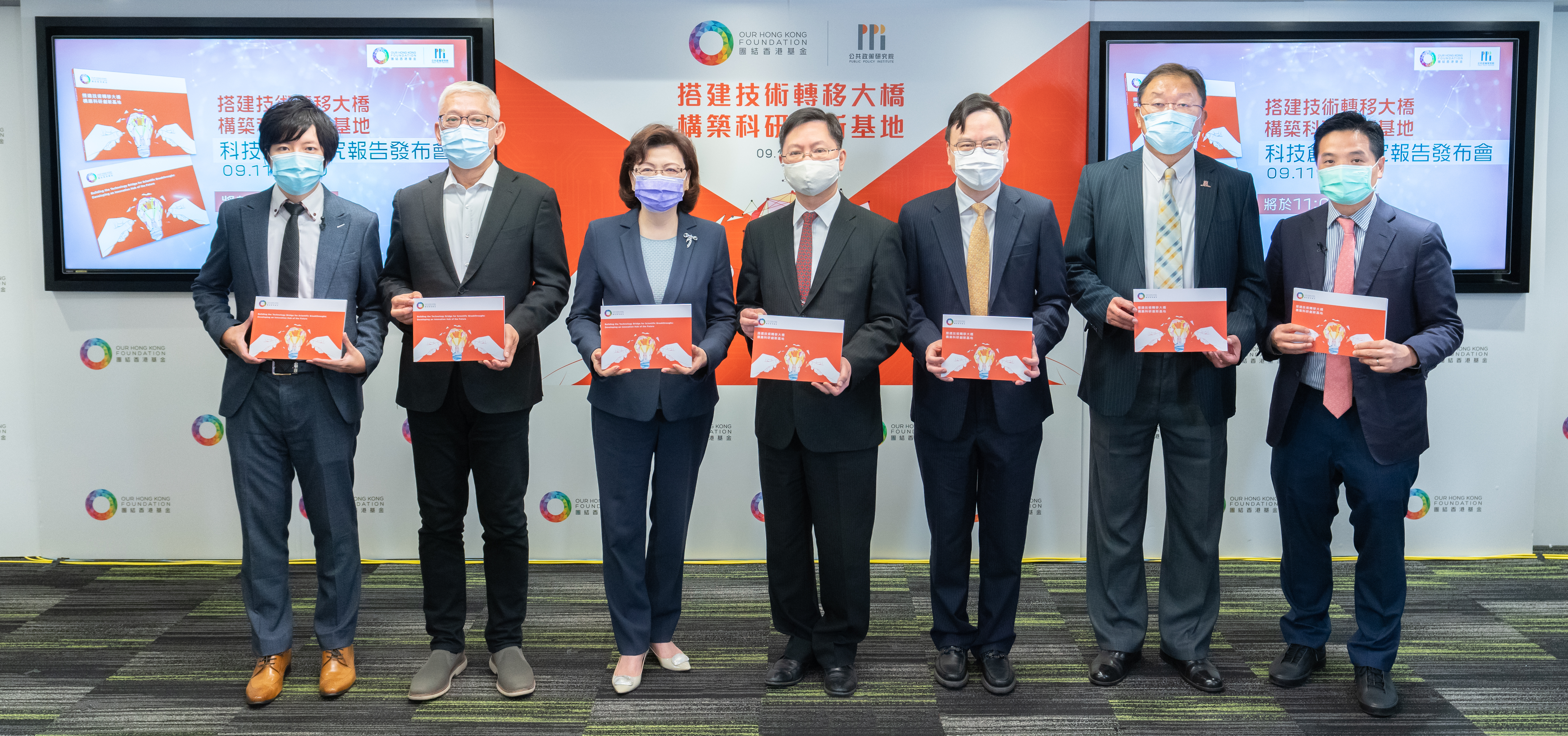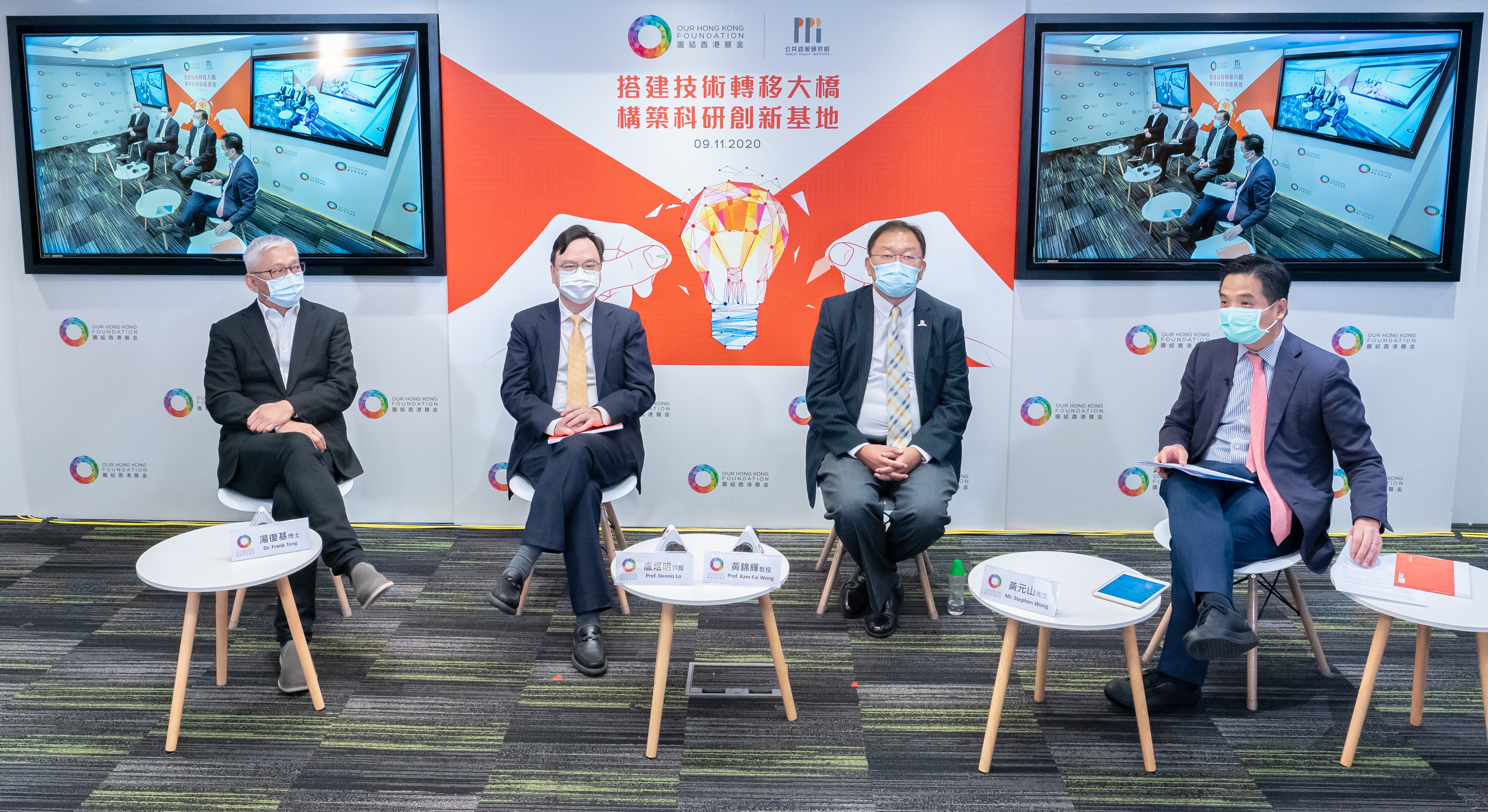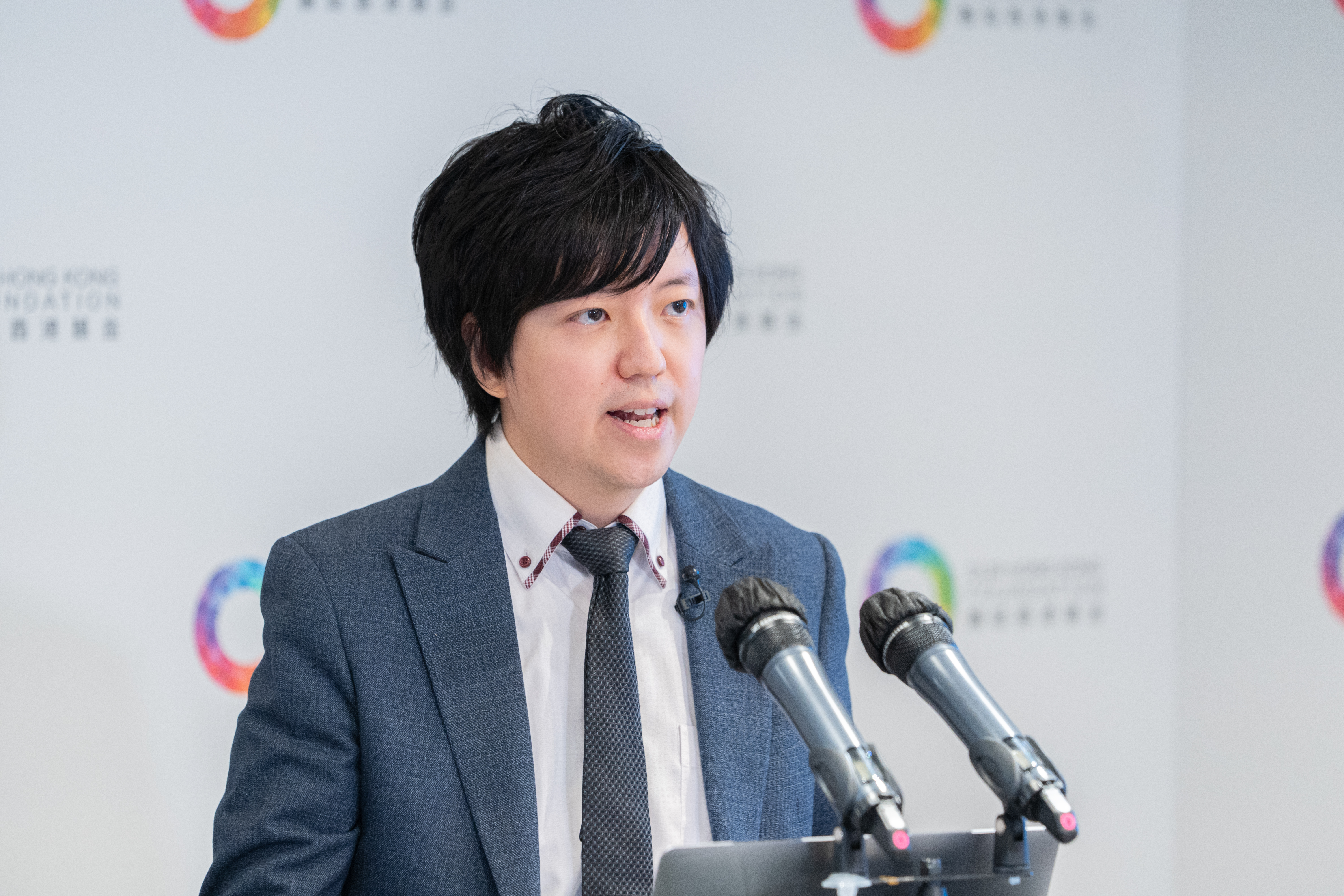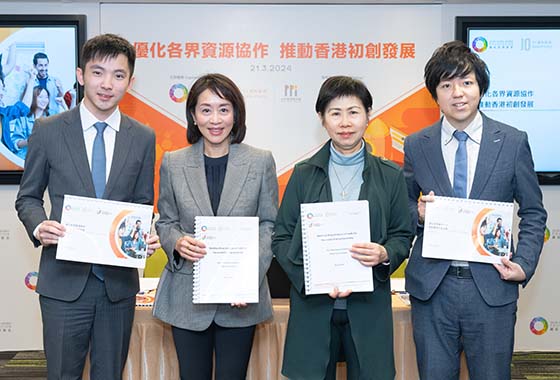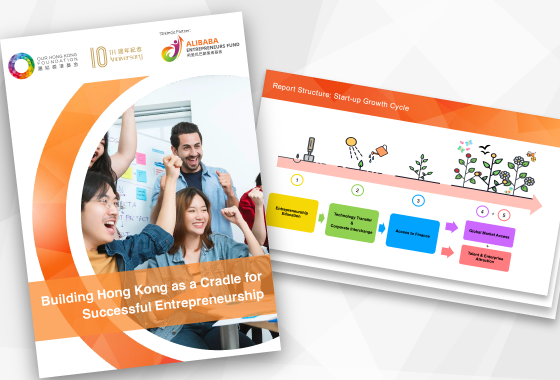Our Hong Kong Foundation Launches Science and Technology Innovation Research Report
Building the Technology Bridge for Scientific Breakthroughs:
Developing an Innovation Hub of the Future
Our Hong Kong Foundation (OHKF) releases its latest research report on Science and Technology Innovation entitled Building the Technology Bridge for Scientific Breakthroughs: Developing an Innovation Hub of the Future. The Report indicates that although universities in Hong Kong have achieved outstanding achievements in basic research, technology transfer is our weak link, making it difficult for universities to effectively transform the ‘treasures’ of scientific research findings into products and services that generate significant social and economic impacts. The Report recommends the strengthening of local institutions’ technology transfer capabilities, so as to create a vibrant innovation and technology ecosystem, and to develop Hong Kong into an international innovation hub.
The Report points out that local universities accounted for over half of Hong Kong's annual total expenditure in R&D. The proportion is much higher than the respective ratios of around one-fifth and one-tenth in the United Kingdom (UK) and the United States (US), which demonstrates the important role that universities play in Hong Kong's innovation ecosystem. In the science and technology innovation report Unleash the Potential in Science and Technology Innovation: Develop Hong Kong into an International R&D Powerhouse that the OHKF published last year, we have put forward recommendations on strengthening the research capabilities of universities and R&D centres. Cutting-edge technology must be commercialised into tangible products or services in order to benefit society, and the key to this is technology transfer. Companies such as SenseTime, Xcelom, and DJI, which are spin-offs from universities in Hong Kong, have all commercialised institutional scientific breakthroughs into disruptive products that bring transformative impacts to the world.
Nevertheless, the performances of local universities in technology transfer are not satisfactory. For instance in 2019, the combined intellectual property (IP) income for all Hong Kong universities totalled HKD 100 million, which was less than one-seventh of that generated by the University of Oxford; the total number of spin-off companies associated with local universities in Hong Kong was only about half of that of the University of Oxford. The OHKF believes technology transfer is the key to unlocking our universities’ R&D ‘treasures’. If we can effectively unleash the commercial potentials of local universities' research findings, not only would we rejuvenate the local innovation ecosystem but also generate immense benefits for Hong Kong’s economic and social development. On this note, we put forward seven policy recommendations as follows:
Recommendation 1: Foster a culture conducive to knowledge transfer in universities by enhancing the assessment framework and funding allocation linkage
In terms of technology transfer indicators, the data currently collected and published by the University Grants Committee (UGC) and local universities is less than the data disclosed by their overseas peers. Furthermore, the performances of universities regarding these indicators are not tied to the amount of government funding for technology transfer, leading to the difficulties in accessing universities’ performance in technology transfer, and also reducing their motivation to promote technology transfer.
The OHKF recommends that the UGC should take reference to the UK's Higher Education Statistics Agency and the Knowledge Exchange Framework, by setting up a more comprehensive database, establishing Key Performance Indicators (KPIs) to assess universities’ technology transfer performance, and allocating funding for technology transfer to universities based on their performance, so as to further encourage a culture conducive to technology transfer among institutions.
Recommendation 2: Enhance IP mobilisation by offering more flexibilities and options for researchers to commercialise their research
The culture of technology transfer is constrained by conservative university policies, such as the ownership, usage, and transfer of patents and the associated revenue-sharing. For example, with regard to the policy on patent ownership in Hong Kong, unless the inventor pays a high price to buy out the patent, the ownership of the patent will remain with the university. However, overseas universities are relatively more generous, with some allowing the inventor to obtain the patent ownership directly, and some allowing the spin-off company to exchange a small share of equity for the patent license. In terms of outside practices, out of the 52 weeks in a year, university staff are currently unable to spend more than one day per week (including weekends, public holidays, and annual leave) for outside work.
The OHKF suggests that local universities should relax the regulations on IP rights and outside practices, hence offering universities’ staff greater flexibility and motivation to commercialise their research outcomes.
Recommendation 3: Improve university research commercialisation through Technology Transfer Offices and a Technology Transfer Alliance
The OHKF proposes that universities should invite more professionals, such as business leaders and investors, to join their technology transfer committees to provide diverse professional advice. Also, universities should recruit experts from industries and academia into their technology transfer offices (TTOs). At the same time, we also recommend the TTOs of local universities band together to form a technology transfer alliance (TTA). The TTA should complement the work of TTOs and establish a university-industry network, thus pooling resources to promote the commercialisation of universities’ R&D achievements.
Recommendation 4: Strengthen the Technology Start-up Support Scheme for Universities
Entrepreneurship is another option for commercialising basic research. The OHKF recommends that the HKSAR Government (the Government) should improve the Technology Start-up Support Scheme for Universities (TSSSU): In addition to providing condition-free grant for verifying technical feasibility and developing product prototypes in the first phase, a second phase can be added to provide additional government funding for start-ups which succeeded in securing funding from the private market. Tax incentives should also be offered to encourage private investment for these start-ups. At the same time, the TSSSU should foster collaborations with the Hong Kong Science and Technology Parks (HKSTP) and Cyberport, and integrate with private incubators and accelerators, so as to enable start-ups to enjoy full access to its resources and networks.
Recommendation 5: Utilise the Future Fund to provide patient capital and deep-technology investment strategy to nurture local spin-offs
Continuous R&D of frontier technologies requires long-term financial support. Hong Kong's edge in R&D lies in ‘deep tech’ such as biotechnology, which requires substantial funding and lengthy R&D processes (so-called patient capital), but it can bring about profound and long-lasting contributions. Earlier, the Government announced that it would use a portion of the Future Fund to set up an investment portfolio called the ‘Hong Kong Growth Portfolio’. The OHKF agrees with this initiative, and believes that if the ‘Hong Kong Growth Portfolio’ can take reference from IP Group and provide patient capital to deep tech spin-offs of local universities, it will amplify the impacts of institutional R&D outcomes, open up new industry opportunities, and further enhance the long-term productivity of Hong Kong's economy.
Recommendation 6: Establish a high-level Science and Development Office to advise the Chief Executive and the Cabinet, provide strategic directions for overall public R&D funding, and identify use cases to be piloted by public bodies
The Government has not established any independent body to provide scientific advice, thus it is unable to keep abreast of the latest global trends in innovation and industry development, resulting in a lack of forward-looking blueprint and vision. Drawing on the practices of the US and Singapore, the OHKF recommends the Government set up a Science and Development Office (SDO) headed by a Chief Science and Development Officer and joined by academics and scientists. The SDO will advise the Chief Executive and the Cabinet, formulate strategic directions for overall public R&D funding, and promote the pilot use of local R&D outcomes in the public sector.
Recommendation 7: Develop the Kowloon Bay Action Area into a world-class innovation district
The technology transfer of innovation achievements cannot be realised without support from the business sector and industry communities. HKSTP, Cyberport, and the Hong Kong-Shenzhen Innovation and Technology Park at the Lok Ma Chau Loop are major science and technology innovation infrastructures, but they are all located far away from the two central business districts. Kowloon East is conveniently located in the proximity of universities, R&D centres, as well as the Data Technology Hub and the Advanced Manufacturing Centre in the Tseung Kwan O Industrial Estate. It is also an important location for the Government to pilot new technologies such as smart city. Therefore, the OHKF believes that Hong Kong should build a world-class innovation district in Kowloon East. The undeveloped area of the Kowloon Bay Action Area is relatively sizable in Kowloon East. By taking reference from overseas experience, the OHKF proposes that the Government should earmark one-third to one-half of the Kowloon Bay Action Area for the development of a world-class innovation district, which can provide space for the expansion of HKSTP and Cyberport, and attract AI and fintech firms.
Professor Dennis Lo, Associate Dean (Research) of Faculty of Medicine, CUHK, remarked, ‘Relaxing the restriction on outside practices shall offer greater flexibility for researchers to engage in technology transfer activities. This can effectively encourage more research talents to participate in technology transfer and research commercialisation, and to fully capitalise on Hong Kong's R&D edge.’
Professor Kam Fai Wong, Associate Dean (External Affairs) of Faculty of Engineering, CUHK, commented, ‘By improving the assessment framework and KPIs of universities’ technology transfer activities, we can strengthen the importance attached to technology transfer by institutions, promote healthy competition among universities, and co-build a vibrant technology transfer atmosphere.’
Dr Frank Tong, Managing Partner of QBN Capital, highlighted that, ‘Long-term funding support can play a decisive role in the successful development of disruptive deep tech. If we can follow the model of the UK's IP Group, we will be able to propel the commercialisation of deep tech R&D, thereby creating substantial economic and social impacts.’
Kenny Shui, Assistant Research Director and Head of Economic Development Research of OHKF, pointed out that, ‘The Government has strengthened investment in the development of technology and innovation in recent years, but the focus largely remained at the stage of basic research. If we can bridge the gap in technology transfer between applied research and the market, and commercialise Hong Kong's exceptional research achievements, we will be able to generate a new way out for Hong Kong's economic and industrial development.’
Full report of Building the Technology Bridge for Scientific Breakthroughs: Developing an Innovation Hub of the Future:
Chinese version: https://bit.ly/3lc1y8z
English version: https://bit.ly/2U6YA9l
Virtual press conference: https://youtu.be/QarDF0tiT_s?t=250
